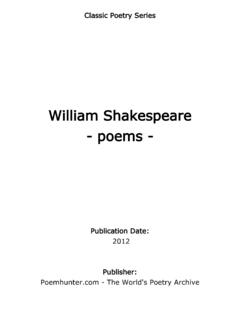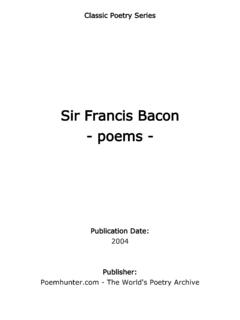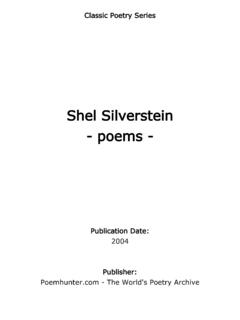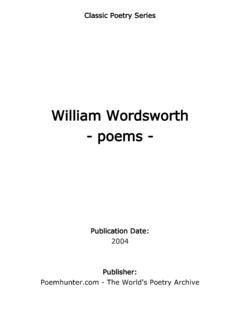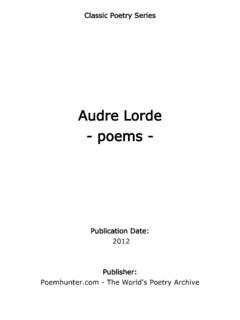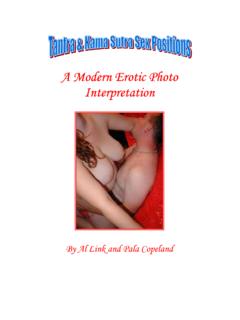Transcription of Louise Gluck - poems - Poem Hunter
1 Classic Poetry Series Louise Gluck - poems - Publication Date:2004 - The World's Poetry ArchiveLouise Gluck (22 April 1943) Born in 1943, Louise Gl ck is an American poet. She was born in New York Cityand grew up in Long Island. Her father helped invent the X-Acto Knife. Gl ckgraduated in 1961 from George W. Hewlett High School, in Hewlett, New went on to attend Sarah Lawrence College and Columbia University. Gl ck won the Pulitzer Prize for Poetry in 1993 for her collection The Wild ck is the recipient of the National Book Critics Circle Award (Triumph ofAchilles), the Academy of American Poet's Prize (Firstborn), as well as numerousGuggenheim fellowships. She lives in Cambridge, Massachusetts, and waspreviously a Senior Lecturer in English at Williams College in Williamstown, ck currently teaches at Yale University, where she is the Rosencranz Writer inResidence, and in the Creative Writing Program of Boston University.
2 She hasalso been a member of the faculty of the University of Iowa. Gl ck is the author of eleven books of poetry, including Averno (2006); TheSeven Ages (2001); Vita Nova (1999), which was awarded The New Yorker'sBook Award in Poetry; Meadowlands (1996); The Wild Iris (1992), whichreceived the Pulitzer Prize and the Poetry Society of America's William CarlosWilliams Award; Ararat (1990), which received the Library of Congress's RebekahJohnson Bobbitt National Prize for Poetry; and The Triumph of Achilles (1985),which received the National Book Critics Circle Award, the Boston Globe LiteraryPress Award, and the Poetry Society of America's Melville Kane Award. The FirstFour Books collects her early poetry. Louise Gl ck has also published a collection of essays, Proofs and Theories:Essays on Poetry (1994), which won the PEN/Martha Albrand Award forNonfiction.
3 Sarabande Books published in chapbook form a new, six-part poem,October, in 2004. In 2001 Yale University awarded Louise Gl ck its BollingenPrize in Poetry, given biennially for a poet's lifetime achievement in his or her other honors include the Lannan Literary Award for Poetry, the Sara TeasdaleMemorial Prize (Wellesley, 1986), the Massachusetts Institute of TechnologyAnniversary Medal (2000), and fellowships from the Guggenheim and Rockefellerfoundations and from the National Endowment for the Arts. She is a member of the American Academy and Institute of Arts and Letters, andin 1999 was elected a Chancellor of the Academy of American Poets. In 2003 shewas named as the new judge for the Yale Series of Younger Poets and continuesto serve in that position.
4 Gl ck was appointed the US Poet Laureate from 2003-2004, succeeding Billy - The World's Poetry ArchiveA Fable Two women withthe same claimcame to the feet ofthe wise king. Two women,but only one king knewsomeone was he said wasLet the child becut in half; that wayno one will goempty-handed. Hedrew his , of the twowomen, onerenounced her share:this wasthe sign, the saw your mothertorn between two daughters:what could you doto save her but bewilling to destroyyourself she would knowwho was the rightful child,the one who couldn't bearto divide the mother. Louise - The World's Poetry ArchiveA Fantasy I'll tell you something: every daypeople are dying. And that's just the day, in funeral homes, new widows are born,new orphans.
5 They sit with their hands folded,trying to decide about this new life. Then they're in the cemetery, some of themfor the first time. They're frightened of crying,sometimes of not crying. Someone leans over,tells them what to do next, which might meansaying a few words, sometimesthrowing dirt in the open grave. And after that, everyone goes back to the house,which is suddenly full of widow sits on the couch, very stately,so people line up to approach her,sometimes take her hand, sometimes embrace finds something to say to everbody,thanks them, thanks them for coming. In her heart, she wants them to go wants to be back in the cemetery,back in the sickroom, the hospital. She knowsit isn't possible. But it's her only hope,the wish to move backward.
6 And just a little,not so far as the marriage, the first kiss. Louise - The World's Poetry ArchiveA Myth of Devotion When Hades decided he loved this girlhe built for her a duplicate of earth,everything the same, down to the meadow,but with a bed added. Everything the same, including sunlight,because it would be hard on a young girlto go so quickly from bright light to utter darkness Gradually, he thought, he'd introduce the night,first as the shadows of fluttering moon, then stars. Then no moon, no Persephone get used to it the end, he thought, she'd find it comforting. A replica of earthexcept there was love 't everyone want love? He waited many years,building a world, watchingPersephone in the , a smeller, a you have one appetite, he thought,you have them all.
7 Doesn't everyone want to feel in the nightthe beloved body, compass, polestar,to hear the quiet breathing that saysI am alive, that means alsoyou are alive, because you hear me,you are here with me. And when one turns,the other turns That's what he felt, the lord of darkness,looking at the world he hadconstructed for Persephone. It never crossed his mindthat there'd be no more smelling here,certainly no more - The World's Poetry Archive Guilt? Terror? The fear of love?These things he couldn't imagine;no lover ever imagines them. He dreams, he wonders what to call this he thinks: The New Hell. Then: The the end, he decides to name itPersephone's Girlhood. A soft light rising above the level meadow,behind the bed.
8 He takes her in his wants to say I love you, nothing can hurt you but he thinksthis is a lie, so he says in the endyou're dead, nothing can hurt youwhich seems to hima more promising beginning, more true. Louise - The World's Poetry ArchiveA Summer garden Several weeks ago I discovered a photograph of my mothersitting in the sun, her face flushed as with achievement or sun was shining. The dogswere sleeping at her feet where time was also sleeping,calm and unmoving as in all photographs. I wiped the dust from my mother's , dust covered everything; it seemed to me the persistenthaze of nostalgia that protects all relics of the background, an assortment of park furniture, trees and shrubbery. The sun moved lower in the sky, the shadows lengthened and more dust I removed, the more these shadows arrived.
9 The childrenleaned over the rose border, their shadowsmerging with the shadows of the roses. A word came into my head, referringto this shifting and changing, these erasuresthat were now obvious it appeared, and as quickly it blindness or darkness, peril, confusion? Summer arrived, then autumn. The leaves turning,the children bright spots in a mash of bronze and sienna. 2 When I had recovered somewhat from these events,I replaced the photograph as I had found itbetween the pages of an ancient paperback,many parts of which had beenannotated in the margins, sometimes in words but more oftenin spirited questions and exclamationsmeaning "I agree" or "I'm unsure, puzzled " The ink was faded.
10 Here and there I couldn't - The World's Poetry Archivewhat thoughts occurred to the readerbut through the bruise-like blotches I could senseurgency, as though tears had fallen. I held the book was Death in Venice (in translation):I had noted the page in case, as Freud believed,nothing is an accident. Thus the little photographwas buried again, as the past is buried in the the margin there were two words,linked by an arrow: "sterility" and, down the page,"oblivion" "And it seemed to him the pale and lovelysummoner out there smiled at him and " 3 How quiet the garden is;no breeze ruffles the Cornelian has come. How quiet it isnow that life has triumphed.
